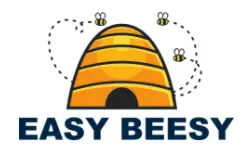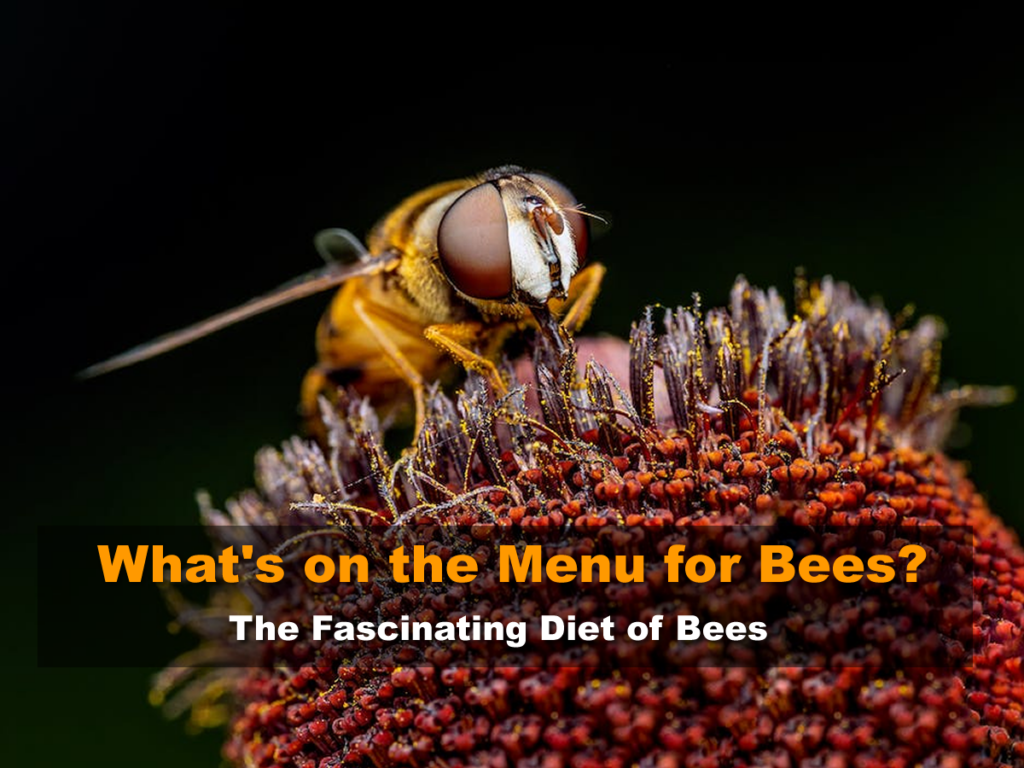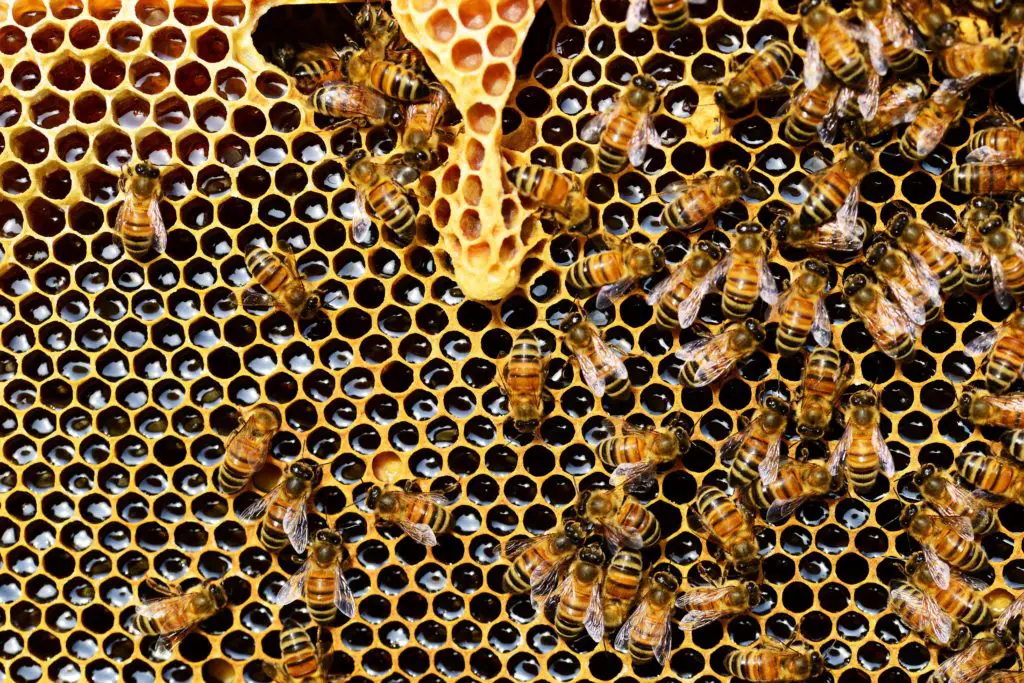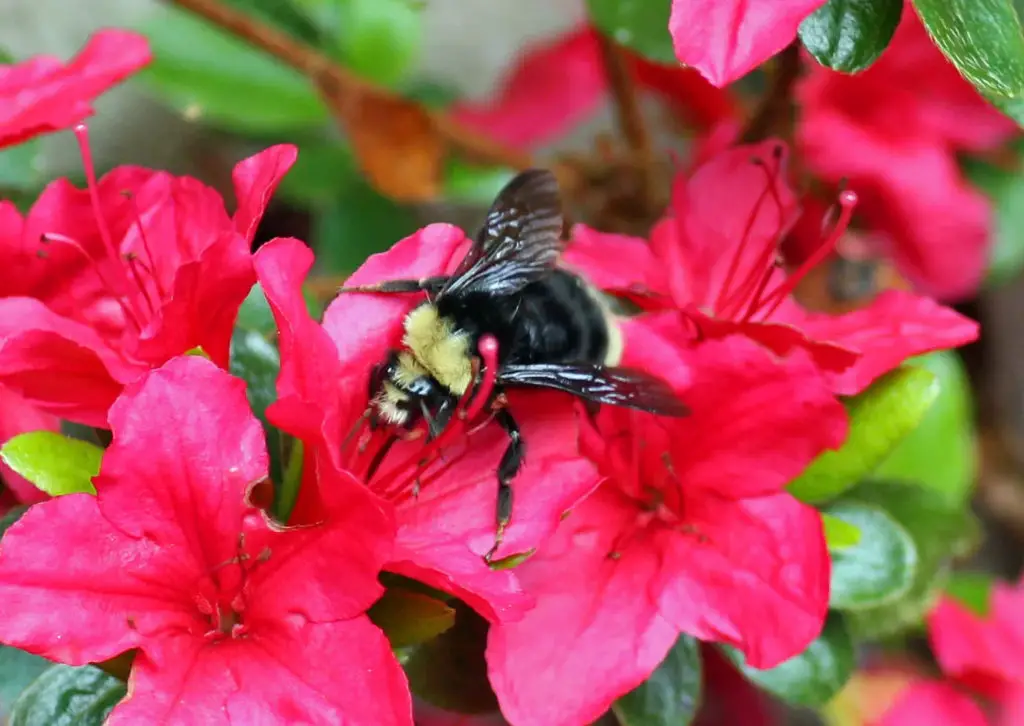Affiliate Disclaimer - As an Amazon Associate I earn from qualifying purchases.
It supports the website. So, Thank you
Have you ever been tricked by the question what do cows drink? The answer is obviously water but most people’s brains fool them into saying milk because that’s a liquid we associate with cows. So if I were to ask you what do bees eat, would your answer be honey?
What do bees eat? This isn’t a trick question because bees actually do eat honey. However, this isn’t the only part of their diet – they’ll eat other things like nectar and pollen.
Whether you’re a beekeeper looking to learn more about bee care or simply someone who is interested in nature, this article will discuss all aspects of the bee’s diet.
Table of Contents
Why Do Bees Eat Pollen?
If there’s one thing that we’re all familiar with it’s the fact that bees gather pollen. Some species of bees have pollen baskets on their legs which allow them to transport more of this powdery substance to the hive. Others will simply carry the pollen on their hairy bodies.
Pollen is used by bees as a source of protein and in some species, it’s often mixed with nectar to make rich food for the young larvae. This is a very common behavior of the bumble bee.
On the other hand, honey bees will create a product known as bee bread which is a blend of honey, pollen, and bee saliva. Making this substance ensures that the bees are easily able to digest pollen and get the most nutritional benefit from it.
Not all members of the beehive will eat pollen on a daily basis. It’s typically the younger female worker bees that eat the most as it gives them a boost when it comes to making food for the rest of the colony. However, older bees won’t need to have as much pollen as they don’t require as much protein for their role within the colony.
Do Bees Eat Nectar?
Nectar is collected by bees to make honey. This is a sticky liquid produced by flowers during photosynthesis and bees have little pouches in which they carry large amounts of nectar back to the hive.
But this is not only used for making honey and since nectar is high in sugars and carbohydrates, it’s an essential source of energy for the bees. Female worker bees, while out foraging, will often consume some of the nectar they have collected in order to keep them energized for the rest of their outing.
There may be times when the availability of nectar is poor and in this case, bees might feed on a substance called honeydew which is secreted by other insects. Aphids are well known for producing this substance and while it can be a nuisance for gardeners, it’s brilliant for bees.
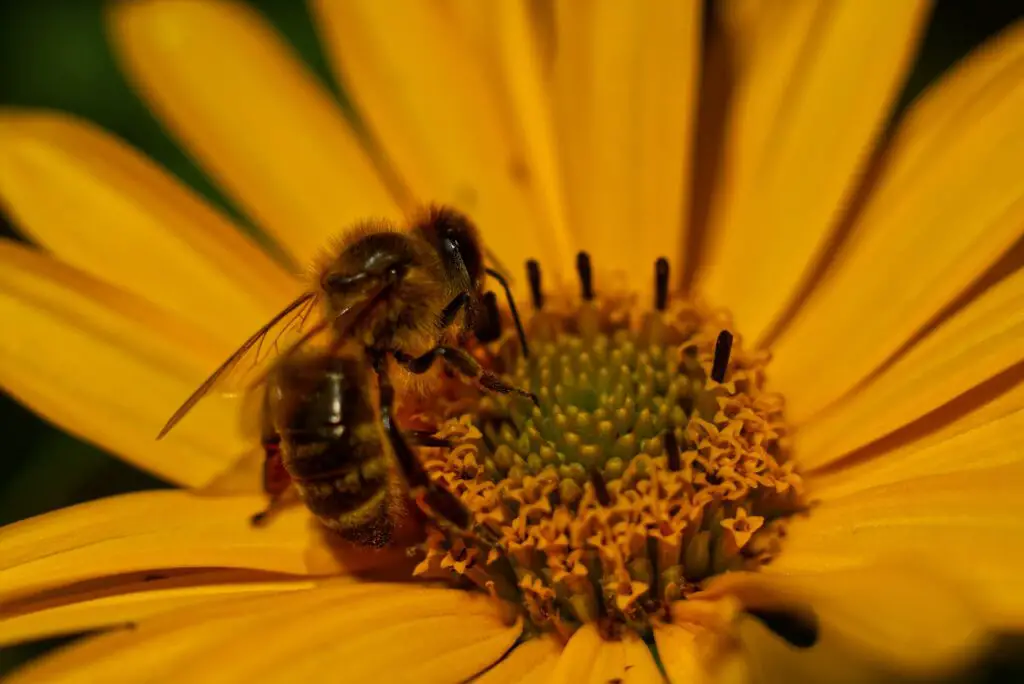
Queens Eat Royal Jelly
When bee larvae hatch, they will feed on a substance called royal jelly for the first few days of life. However, after this, it’s only the larvae that are being raised as new queens that will eat royal jelly. Any bees that are destined to become workers will mainly feed on honey and bee bread until they turn into adults.
Typically, the nurse bees will select young female larvae to become queen during the time before the colony plans to swarm.
The substance royal jelly is secreted by the hypopharyngeal glands of the bees which are located in the head. For many years, we have believed that it is this milky substance that is responsible for the development needs of a growing queen. However, new evidence is suggesting that this isn’t the only thing these larvae need but this is still new research and further work needs to be done to fully understand it.
When a queen bee becomes an adult, she doesn’t necessarily eat honey. Where possible, adult queens will still feed largely on royal jelly as this produces the least waste. What’s more, it’s thought that this diet allows the queen to live as long as possible and these members of the colony have much longer life spans than those of the worker bees.
Do Bees Eat Honey?
Honey bees eat honey as the main part of their diet once they reach adulthood. While they will feed on nectar where they need to, this doesn’t contain enough nutrients to be used as a main food source and is usually only supplementary to the honey they consume. What’s more, where bees store honey in the hive, nectar has a much higher water content which makes it unsuitable for storage.
However, without nectar, the bees would not be able to produce honey so it’s still a very important substance. The honey that is created is not only eaten by the colony there and then but stored in the honeycomb cells which are then capped so that the bees have a cache of food for winter.
It’s not only honey bees that produce and eat honey. While the amounts are far smaller, bumble bees do produce honey. They store this in honey pots in the nest and is used as a food source for both the larvae and the adult bumbles. However, it’s really only in a honey bee nest that you’d find honey in any sort of significant amount.
Do Bees Need Water?
Water is an essential substance for pretty much all life on earth, with a few exceptions. Bees need water just as much as you and I, which is why you’ll often see them flying around your pool, garden pond or even your birdbath.
That said, honey bees don’t go out in search of copious amounts of water and will really only collect it as they need to. What’s more, they never store it in the way they do with honey as, just like nectar, it’s not suitable for this.
However, bees will use water to alter the consistency of their honey when it is too thick to change its viscocity. They’ll also use it to adjust the humidity within the hive as well as alter the temperature.
For anyone that loves nature, providing a source of water for bees in the garden is a really good idea. It doesn’t need to be anything grand, just a simple bowl of water near the bee’s favorite flowers will be more than enough. Just make sure that you give them somewhere to land as bees are not good swimmers. What’s more, doing this will attract an abundance of wildlife to your yard.

Why Do Bees Want To Eat My Food?
How many times have you tried to enjoy an al fresco meal in summer only to find yourself in the middle of a bee highway? Every time I have a BBQ, my deck is swarming with bees that seem to want to get in on the action. If bees’ diets consist mainly of nectar, pollen, and honey, why are they trying to get a look in on your burgers, wings and cocktails?
The problem is that bees are attracted to anything sweet. If you’ve used sweet marinades or glazes, have glasses of soda sitting around, or desserts on the table then you’re putting out an open invite to the local wildlife.
The good news is that bees are typically aggressive creatures and will usually just want to investigate. Once they realize that what’s on offer isn’t part of their diet, they’ll usually get bored and leave. However, if you try to swat them or disturb them in any way, there’s a good chance they’ll try to defend themselves.
In order to prevent unwanted visitors to your garden party, I’d recommend covering all food and drinks when not in use. There are also some other handy things you can do to keep bees away from your garden which I’ve written about here.
What Happens If Bees Don’t Have Honey?
Bees store honey in the comb cells to be used as food over winter. Humans have cottoned onto the fact that honey tastes good and as such, there’s a huge honey production industry that’s producing as much as 1.77 million metric tons of the stuff every year!
But it’s so important that, as beekeepers, we don’t become greedy and overharvest our hives. In the commercial production of honey, this is something that’s well known but a lot of novice apiarists have to learn the hard way. It’s very tempting to go to your hive and harvest all of the honey your colony has made. Doing this will only lead to their demise.
According to experts, you should leave between 90 and 100 lbs of honey for a full-sized colony over winter. In the first year, your bees may not even produce enough to sustain themselves so, without your help, there is a risk of the bees dying.
For this reason, it’s really important to monitor what the bees are consuming over winter and provide them with sugar water as a substitute, should honey reserves run low.
The Shocking Truth About Bee Cannibalism
As a general rule, bees are not meat eaters although I have read some reports that they may be classed as omnivores. Typically, you won’t find them preying on smaller insects but this omnivorous theory comes from the fact that they will turn cannibalistic when they need to survive.
You see, as I discussed earlier, it’s not uncommon for a colony to run out of honey, especially over winter. When this happens, the bees, just like any other creature, will do what it takes to stay alive. If that means eating their own eggs and larvae then so be it. However, this behavior is really only seen in bee colonies that are close to starvation.
Final Thoughts
It always amazes me that bees are so much more complex than people give them credit for. These creatures might be small but they are disciplined and hardworking. Because of this, it’s essential that bees keep their energy levels up and sticking to a good diet is how they achieve this.
Bees mainly eat honey but also consume things like nectar and pollen. What’s more, they use all of these things along with their own saliva to make other products like bee bread which is often consumed by the young.
Queen bees are mainly fed on royal jelly, a milky substance secreted by young adult bees. So it’s easy to see that bee diets are more complex than you initially think.
